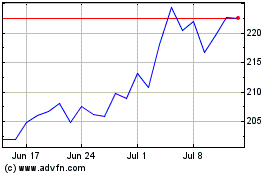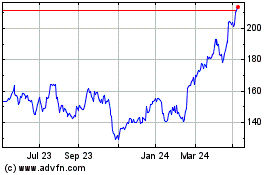Barclays Launches Systematic Study of ESG-Focussed US Equity Funds
August 13 2020 - 9:00AM
Business Wire
ESG-focussed mutual funds are attracting large inflows, but
fundamental challenges remain in defining what constitutes an
ESG-labelled equity fund. In a systematic study of US equity funds,
Barclays’ Quantitative Portfolio Strategy (“QPS”) team finds that
ESG-labelled funds do not necessarily provide more ESG exposure
than conventional funds.
“Responsible investing has become a hot topic in financial
markets in recent years with many investors racing to integrate
Environmental, Social and Governance (ESG) issues into their
investment process,” says Jeff Meli, Head of Research at Barclays.
“In this new report, our QPS team combed through two decades of
funds’ holding data and found a lack of difference in holdings and
investment styles between ESG-focussed and non-ESG US equity
funds.”
The report, entitled ESG funds: Looking beyond the label,
advocates for greater transparency in defining ESG funds, and
offers several suggestions for creating explicit benchmarks that
ESG funds could be measured against to address the lack of a
uniform definition of what constitutes an ESG fund.
Other key findings of today’s report include:
- ESG-labelled funds have attracted a higher percentage of
inflows than other equity funds. In looking at data since 2013, we
find that ESG funds have, on average, enjoyed inflows of about 7%
per year, while non-ESG ones experienced yearly outflows of
2%.
- The growth in assets under management has been driven by
interest in sustainable investing rather than superior performance:
ESG funds have delivered roughly similar returns to other equity
funds since 2013.
- As interest has grown, so has the number of investment options,
with the total number of ESG funds growing significantly since
2006, and total assets under management rising to about 0.7% of the
total market capitalisation of all US stocks.
The report was authored by the QPS team, which provides clients
with evidence-based empirical analysis of all aspects of the
investment process across asset classes, including the impact of
ESG. It complements the two other pillars of Barclays’ ESG
Research: our Sustainable & Thematic offering, which presents
multi-decade, top-down trends and our ESG Fundamental Research
offering, which assesses how ESG attributes affect financial risks
and valuations.
“This report continues a series of studies by the QPS team
investigating the impact of a portfolio’s ESG tilt on performance
and other aspects of the investment process, covering both credit
and equity markets,” says Lev Dynkin, Head of QPS Research.
For more information, please click here.
Notes to Editors
Barclays has long been a pioneer in sustainable banking. In
2012, Barclays Research launched the Impact Series which explores
the social impact of economic, demographic and disruptive changes
affecting markets, sectors and society at large. In 2016, Barclays
and Unreasonable Group co-founded Unreasonable Impact, an
accelerator programme aimed at supporting growth-stage
entrepreneurs whose ventures have the potential to employ thousands
of people worldwide while solving some of the world’s most pressing
social and environmental challenges. In 2019, Barclays announced a
new Sustainable and Impact Banking team; and hosted its second
annual Green Frontiers event, bringing together investors and
financiers to discuss the growing challenge of climate change.
Barclays also launched the Social Innovation Facility that
incubates financial products and services that will have a
sustained social or environmental impact. And, in 2020 Barclays
announced our ambition to be a net zero bank by 2050.
About Barclays
Barclays is a British universal bank. We are diversified by
business, by different types of customer and client, and geography.
Our businesses include consumer banking and payments operations
around the world, as well as a top-tier, full service, global
corporate and investment bank, all of which are supported by our
service company which provides technology, operations and
functional services across the Group. Barclays offers investment
banking products and services in the US through Barclays Capital
Inc. For further information about Barclays, please visit our
website home.barclays.
View source
version on businesswire.com: https://www.businesswire.com/news/home/20200813005476/en/
Ann Thielke +1 212 526 1472 ann.thielke@barclays.com
Barclays (LSE:BARC)
Historical Stock Chart
From Mar 2024 to Apr 2024

Barclays (LSE:BARC)
Historical Stock Chart
From Apr 2023 to Apr 2024
